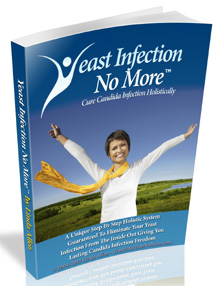3 Tips to Prevent Yeast Infections
Free Video Reveals 1 Weird Tip To Quickly Cure Your Candida Overgrowth & Enjoy Permanent Freedom From Yeast Infections In As Little As 12 Hours - Guaranteed!
>> Yeast Infection Guaranteed Treatment Click Here <<
The one good thing about yeast infections is that they?re usually easy to treat. Even with home remedies, a mild yeast infection will go away within a few days ? and stronger, more entrenched infections will disappear in a week or so if you use medications available at the drug store without a prescription.
But two out of three women who get vaginal yeast infections get another one ? sooner, or later. And diaper rash, oral thrush and male yeast infections, which are all caused by Candida albicans yeast, also come back fairly regularly.
So, once you get rid of your yeast infection, how do you keep it from coming back? There are over 17 different environmental and health conditions that can trigger an infection, so it?s important to become informed about everything on that list to see how you can prevent future yeast infections. You and your best friend could both have a Candida outbreak for completely different reasons.
However, the most common triggers for the itching, the redness, the swelling and the dripping are antibiotics, hormone changes, and a poor immune system. You can?t control all these things, but there are things you can do to remain healthy so your resident yeast won?t go back on the warpath.
Stay Cool and Dry
Yeast loves to live in those warm, dark places that retain moisture. In your underwear, for instance, or under your breasts, in your armpit, or on your baby?s bottom.
To combat the little nasties, keep yourself as dry as you can. Some people find that it helps to use an absorbent powder such as Zeasorb Super Absorbent powder. Be sure you use the non-medicated kind, unless your doctor suggests otherwise. Don?t wear clothing that keeps in moisture ? loose cotton is best. Men with a yeast infection on the penis or with crotch rot, might want to switch to boxers for a while, and stay away from those tight jeans. And air yourself out occasionally ? especially right after a bath or shower, so you know you?re good and dry before you put your clothes back on.
Avoid Cuts, Scrapes and Irritants
Tiny cuts and scrapes in the genital area can give yeast a chance to invade. You can get these itty-bitty injuries without knowing it. You also want to avoid products that cause irritation to the delicate skin on your genital area or on your baby?s bottom.
Common items that cause irritation are scented and colored toilet papers; scented or harsh laundry detergents; and feminine deodorant sprays with scents or chemicals. Sex without adequate lubrication can cause abrasions in the lining of the vagina.
Some women find that tampons, especially the super-absorbent kind, can cause microscopic cuts in their vagina. If you use tampons and get frequent yeast infections, you might want to switch to unscented pads or washable cotton pads for a while to see if it helps.
Many older denture wearers get oral thrush under their denture plates. If this is the case, your doctor will probably suggest that the dentures be treated to remove the yeast, or that you have the dentures replaced for a pair that fits better.
Avoid Antibiotics
I know this isn?t always possible, but you definitely don?t want to take antibiotics unless you have to. People quite often get vaginal yeast infections, and children get oral thrush, right after a course of antibiotics. Make sure you ask your doctor if the antibiotics are really needed.
If you child gets frequent yeast infections and isn?t on antibiotics and isn?t eating a high-sugar diet (a major risk factor for oral thrush), you might want to switch to certified organic beef and poultry. Our meat industry is notorious for feeding large quantities of antibiotics to feedlot cows and caged chickens, to avoid the illnesses that are caused by overcrowding. These antibiotics are then passed on through the meat. The overuse of antibiotics by the meat and poultry industry may be one of the reasons why the incidence of yeast infections has doubled in the last 20 years.
This covers three of the 17 things that can cause yeast infections. Be sure to learn as much as you can about this common condition to protect yourself from this itching, irritating problem.
Jonni Good writes full-time about yeast infections and other important health issues. To learn more about the things you can do cure yeast infections, and avoid getting another one, visit http://www.YourYeastInfection.com
Labels: oral_yeast_infection, penile_yeast_infection, yeast_infection_medicin, yeast_infection_prevention

